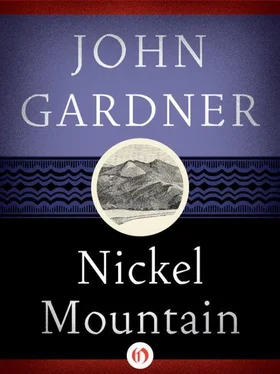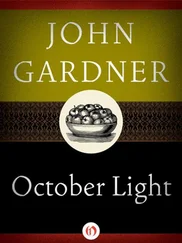There would be time, though. Might have years left yet. A whole new life. No sense driving with the window open, all the same. Made breathing harder. Be realistic.
He was tired, soaked with sweat inside the great black suit.
(Nickel Mountain. That was where the real hills were, and the river, cool, deep with echoes of spring water dripping into it and sliding from its banks!)
Callie’s head came to rest against his shoulder, and her hair had a young, clean smell. (He must have been teasing me, he thought. Surely he was.) Her head on his shoulder was pleasantly heavy; heavy enough, almost, to crush bone.
Callie Wells stood in what was normally the sewing room, just off the parlor. Both doors were closed behind her. She was wearing the old Welsh wedding gown, but she seemed hardly to know it, standing with her hands folded, looking out the window. The room, the weather, the round blue mountains in the distance all seemed to defer to her stillness. The house around her hummed like a hive, but Callie scarcely noticed that either.
It seemed to her the first chance she’d had to be alone in weeks. Every time she turned around there was something to be fitted for, some decision to make — where to put Uncle Russel and Aunt Kate (who were coming from Cleveland after all), what to do if the rings didn’t come from the place up in Utica in time for the wedding, how to get Aunt Anna to the rehearsal since she flatly refused to ride in Uncle Gordon’s truck. But it couldn’t be weeks, or anyway it couldn’t be more than two, because it was just two weeks and three days ago now that they’d decided.
Her father had come into the kitchen blinking like an owl, holding up his flannel pajama bottoms with one hand, scowling, cross enough to eat roofing nails, and Henry had said formally, holding her hand, “Mr. Wells, I’d like your permission to marry your daughter.” Callie had glanced up at him sideways and had seen again, as if it were a new discovery, how much she truly admired him, comical as he might seem to some, and she’d felt awe that he should be going through all this for her. He was painfully embarrassed, and scared as well, though he was older than her father. He was feeling, no doubt, as ridiculous as he looked — a great fat creature in steel-rimmed glasses, his ears pressed flat to his head as though he’d spent his whole life in a tight-fitting cap.
Her father said, “At two A.M. in the morning? You crazy?”
“I’m serious, Frank,” Henry said. All the house and the surrounding night seemed to echo his earnestness. He’s serious.
She’d broken in quickly, holding Henry’s hand more tightly, “Daddy, I’m going to have a child.”
His face went white, then red. He was angrier than she’d ever seen him, angry enough to murder Henry (but Henry could break her father in half as easily as Prince snapped hambones between his teeth). Her father began swearing but she broke in again, “Not by Henry, Daddy. By somebody else.” He just stared at her then, and then at Henry. Then he pulled out the chair from the kitchen table and sat down. His stubbly cheeks were hollow and there were shadows between his ribs. He chewed his lip and wrung his hands, tears washing down his nose and whiskers. After a minute he called her mother, and she came in at once — she’d been standing just behind the door — her plump white hands catching the bathrobe together.
She said, “Mother, we’re going to be married.”
Her mother’s face squeezed into a grimace and she started crying with a great whoop, splashing up her hands and running to her, falling on her, hugging her tightly and sobbing. “Oh, Callie! My poor baby! We’ve failed you!” Immediately Callie was crying too, sobbing her heart out. It must have been two minutes they cried like that. Then it came to her that Henry was there, and that they didn’t understand at all.
“Mother,” she said, “I love Henry. I’m happy.”
“Child. My child!” her mother said, and a new burst of sobbing overwhelmed her.
She felt a strange sensation: as if the floor were moving, shifting gently, carrying her somewhere, as in the old story, and telling her something. She accepted her mother’s tight embrace but felt unresponsive, separated in a way that in a moment there would be no repairing. Her mother felt it too, or realized that Callie was not crying now, that something had changed.
“Mother,” she said again, “I love him.”
After a moment her mother drew back to look at her, trying to read her face like a word left by Indians. She said, “Love, Callie! You’re only seventeen years old.”
Callie said nothing.
Her mother was baffled; grieved and frightened, but more than that, filled with an emotion too deep for separation into grief and fear: as though Callie had gone down to a small boat at night, and her mother stood on a towering ship that was drawing away and could never turn back. Without words, Callie knew — with a sinking feeling — that her mother could never know for sure — anymore than she could know of her mother — that she was happy. For the first time now, her eyes still baffled, Callie’s mother turned to look at Henry. She stared as if she’d never really noticed, in all her years, that he was grotesque. He endured the look in patience like an elephant’s, an enormous hulk of misery, his hands folded behind his back, huge belly thrown forward, his head slightly tipped and drawn back a little. (Could she see that, inside that suit like a mortician’s, he was a gentle man, and a good man besides?)
Her father said, “This calls for a drink!”
Everything called for a drink, to her father. Her mother said, “I’ll put some coffee on.”
“Hell,” her father said, “it don’t call for coffee. Damn coffee, that’s what I say. Is that what you say, Henry?”
Henry smiled, showing his overbite. “Mmm,” he said, noncommittal.
“Don’t curse, Frank,” her mother said.
“Right,” her father said. “Fuck cursing!” He got out the Jim Beam and two of the painted glasses from the gas station and some ice. He was so nervous he could hardly get the cubes from the metal tray. He waved Henry to a chair and opened the bottle.
Her mother went over to the stove. When she’d turned on the butane under the pot she looked around, horrified, weeping again. “I forgot to say congratulations!” She came back to Callie and hugged her as tightly as before, and now once more both of them were sobbing, but happily this time, Callie anyway, her mother still undecided.
“Congratulations, you two!” her father said, exactly like someone on television. He stood up and reached over to shake Henry’s hand, his other hand clutching the pajama bottoms.
They’d sat up all night after that, talking, her father and Henry drinking whiskey, she telling her mother how happy she was, and looking fondly at Henry (growing more and more erect and dignified as the drinking wore on, smiling more and more foolishly, his speech increasingly labored and solemn — her father’s, too). She had wanted to shout, Oh Mother, look at him, look at him! And every glinting glass and dish in the cupboards understood. But how could her parents understand it? What was important was unspeakable, both on her side and on her mother’s. And so instead they had talked about plans, and she had wondered, Is that what everybody does, in every marriage. She and Henry had meant to be married by a justice of the peace, but her mother insisted on a wedding in church. You only get married once, she said; a church wedding was a sacred thing; the relatives would be hurt. Aunt Anna would be the organist, because it wouldn’t do for her own mother to be organist at her own daughter’s wedding. Callie would wear white. “Mother, I’m pregnant,” Callie said, “I’m already beginning to show.” “People expect it,” her mother said. She’d given in to everything. It didn’t matter. In fact, she was secretly glad she’d be married in church. She’d said, “Henry, what do you think?” “Ver-y good,” he said, nodding, judgmental. “A ver-y Solomon cajun.” When dawn came and the robins started singing, Henry and her father were fast asleep, her father lying on his arms on the table, Henry sitting erect and placid, mouth open, like a sleeping child.
Читать дальше











